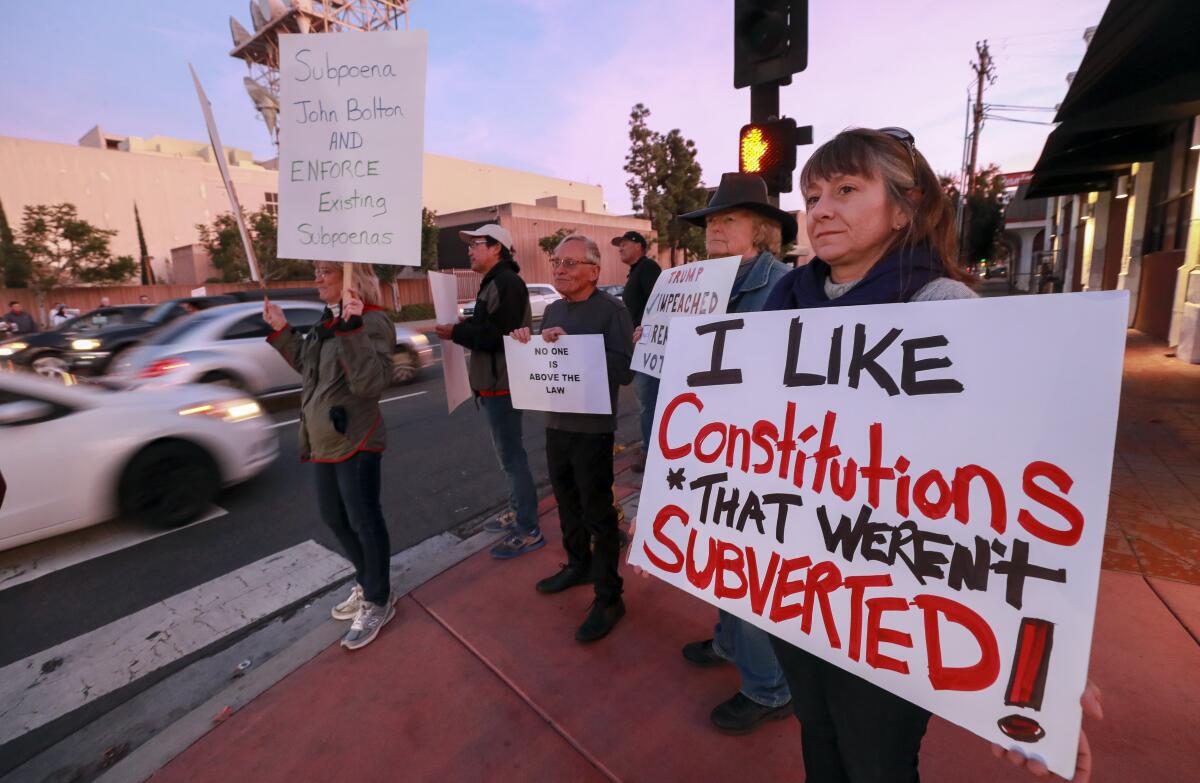Op-Ed: Can’t remove the president from power? Do the reverse: Remove power from the president

Now that Democrats have failed in their attempt to remove the president from power, it’s worth asking why they haven’t seriously considered the reverse: removing power from the president.
We have seen, over the 33 months since Donald Trump took the unusual step of firing FBI Director James B. Comey, any number of behavior-specific explanations for why the 45th president must go: For coordinating with the Kremlin, obstructing the Russia investigation, making “racist comments” about four congresswomen, saying he would accept “dirt” from foreign governments about his domestic political opponents and finally the House’s two impeachment articles: abuse of power and obstruction of Congress.
But what we have not seen is anything like a structural critique of ever-accumulating executive branch power itself. Democrats don’t like the way Trump uses his authority, but that doesn’t mean they want any less of the stuff in the White House, particularly when they get back the keys. To the contrary.
In his response to Trump’s State of the Union address Tuesday night, leading presidential candidate Sen. Bernie Sanders (I–Vt.) lamented that the tariff-happy president wasn’t being punitive enough toward American companies. “The NAFTA 2.0 deal that he recently signed,” Sanders said, “will not prevent a single corporation from shutting down factories in the United States and moving them to Mexico.”
In her official Democratic Party response, Michigan Gov. Gretchen Whitmer focused not on Trump’s monarchical gestures during the speech — granting a scholarship, promoting a veteran, presenting a Medal of Freedom on the spot, theatrically reuniting a military family — but rather, on all the things Democratic governors are accomplishing by executive fiat in defiance of their legislatures.
“Wisconsin Gov. Tony Evers unilaterally increased school funding by $65 million last year,” Whitmer bragged.
The Democratic presidential field, with the notable exception of faltering front-runner Joe Biden, has been engaging in a race to see who can make the most elaborate promises of immediate executive action. Forget 100 days; we’re now talking 100 hours to see what that magical Oval Office pen and phone can do.
On Day One, President Elizabeth Warren would wipe out student loans for 42 million people, ban fracking “everywhere” and block any future fossil fuel leases on public lands and offshore. We are still awaiting the full Day One list from a future President Sanders, but we know it includes an executive order to “legalize marijuana in every state in this country.”
Legalizing marijuana is a wonderful and long-overdue idea, but Sanders’ way of getting there is not. Federal law, including the odious Controlled Substances Act, is constitutionally required to originate from or be struck down by either Congress or constitutional amendment. A presidency with enough power to legalize Activity X irrespective of Congress or the desires of states is a presidency with enough power to criminalize that same activity when the other team wins. It’s a seesaw of authoritarianism, and we should all want to get off.
What’s remarkable about the personal response to Trump’s imperial actions is how completely different it is compared with the structural reaction against President Nixon’s. Democrats (and some Republicans) in the wake of Watergate went on a spree of pruning back the runaway executive branch.
The 1973 War Powers Resolution reasserted the legislative branch’s authority to declare war and approve emergency military actions. The 1974 Congressional Budget and Impoundment Control Act — which, fun fact, is the law Trump violated by withholding appropriated aid to Ukraine — sought to reestablish congressional power of the purse. The 1974 upgrade of the Freedom of Information Act was designed to prevent governments from hiding their activities. The 1978 Foreign Intelligence Surveillance Act was supposed to block warrantless snooping of U.S. citizens.
Even reciting the names of those reforms helps explain why anti-Trump animus has not translated into renewed skepticism of executive power. Presidents of both major parties, particularly during this century, have fought doggedly to break free from their institutional shackles. George W. Bush, with his high-ranking veterans from the Nixon administration, made rolling back the Watergate reforms a key philosophical aim. Barack Obama, after campaigning as a constitutionalist, made a mockery of war powers in Libya.
And the more tribal Congress has become, the more willing it has been to forfeit anything like the consistent application of constitutional prerogatives, particularly concerning the wielding of life-and-death military power.
For anyone who would like to once again see an independent legislature, the 99% partisan impeachment process in both chambers of Congress is cause for despair. As is the Democratic presidential field’s will to executive power. If ever America is to get off the populist seesaw, we’re going to need to root less for politicians, and more for the rules and mores than can restrain them.
Matt Welch is editor at large at Reason magazine and a contributing writer to Opinion.
More to Read
A cure for the common opinion
Get thought-provoking perspectives with our weekly newsletter.
You may occasionally receive promotional content from the Los Angeles Times.










